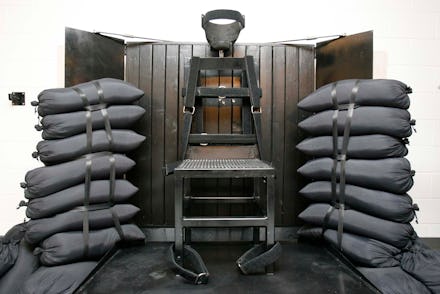Utah Has Officially Signed into Law the Most Inhumane Capital Punishment Ever

The news: Utah Governor Gary Herbert signed a bill into law Monday allowing for the use of firing squads when there's a shortage of lethal injection drugs, which, in Utah, is a growing problem.
Of the 32 states that allow the death penalty, Utah is the now the only one to approve state-sponsored shooting if drugs are sparse. In Oklahoma, the only other state to allow death by firing squad, it hinges upon whether lethal injection or electrocution are deemed unconstitutional for the specific case.
"We regret anyone ever commits the heinous crime of aggravated murder to merit the death penalty and we prefer to use our primary method of lethal injection when such a sentence is issued," Governor Herbert's spokesman Marty Carpenter said in a statement Monday. "However, when a jury makes the decision and a judge signs a death warrant, enforcing that lawful decision is the obligation of the executive branch."
The background: There are five approved methods of capital punishment used in the United States, varying from state to state. All states use lethal injection as the primary method.
But since all the death penalty states prefer lethal injection, the drugs have started running low, or the companies making them discontinued manufacturing. Pharmaceutical company Hospira halted its manufacture of the unconsciousness-inducing sodium thiopental, saying it didn't want to be so closely associated with executions.
Utah is one of the states that insists its lethal injections be done with the three-part cocktail of sodium thiopental, pancuronium bromide and potassium chloride, which, in order, causes unconsciousness, muscle paralysis and, finally, stops the heart. But with the drugs drying up, governments either seek out alternative compounds or include fallback methods. Varying state to state, this includes electrocution, used by eight states, gas chamber, used by four states, and hanging, used by three states.
The last man to die by a firing squad was Ronnie Lee Gardner, in 2010. In 1984, Gardner killed a Salt Lake City man during a robbery, then shot an attorney upon trying to escape a hearing in 1985. While the Church of Jesus Christ of Latter-day Saints no longer teaches it, firing squad use in Utah has roots in the Mormon Church, which used to practice a tradition of blood atonement. More simply: a life for a life.
The takeaway: While trying to find alternative sources for heart-stopping drugs is probably a chore, especially since the European Union doesn't allow any exports that might be used for capital punishment, it's difficult to accept the approval of a kill method more suited to a Zorro movie than state government.
If the basis for a state decision has roots in a religious history of shedding blood as the ultimate repentant sacrifice, maybe Utah should look into an alternative with a cleaner and less religiously specific history and a generally less grisly outcome.
"When you take somebody and you tie them to a chair, put a hood over their head, and you shoot them from 25 feet with four rifles pointed at their heart," Gardner's brother, Randy Gardner, told the Associated Press, "that's pretty barbaric."